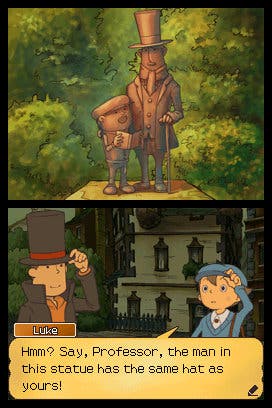Professor Layton and the Lost Future
It¡¯s about time.
Suspension of disbelief is a beautiful thing in the hands of Level-5. The developers of Professor Layton and the Lost Future are asking players, for the third time, to buy into the ludicrous premise of the Layton story: an obsessive archaeology professor solves mysteries for the public, under the implicit contract that they repay him by feeding his hunger for bite-size brainteasers. Everyone obliges this deal. And by the way, there's time travel in this one, too. Because that always makes sense.
Out of context, it sounds like a bit much, but Level-5 assumes that its game's charm and fun will justify the silliness. And it's right. Lost Future is infused with such a good-natured confidence that it would be cynical to question it. We all know by now that the Layton games are, in essence, an attempt to build a wonderful theatre around the logic puzzles at their heart. It's a pleasure to watch Level-5 put on its show. Who would want to fight it?
Those all-important puzzles have the same puckishness and flair as ever, maybe more so, even as they hew to a well-worn set of genres. You've got your maths tricks, as in "It takes one man two minutes to cross the river with three passengers in the boat...", and logic exercises along the lines of "A says B is lying, and D insists C is telling the truth." There are also mini-mazes, "What's wrong with this photo?" teasers, and others – basically, any puzzle that would look at home on the back of a cereal box has found its way into Lost Future.

The puzzles burst with colour. It's the most vibrant Professor Layton title yet, getting a lot of visual pop out of the DS' tiny screens. The writing is crisp, too, with a freer sense of humour than previous games in the series. Lost Future is entirely accessible to Layton newbies, but fans will notice a few winks and nods as a reward for their loyalty.
In keeping with tradition, the professor's trunk contains three optional side-games that are unlocked little-by-little as the main story progresses. From easiest to hardest, these mini-games are a storybook whose missing pieces you must fill in with stickers, a car game in which you must direct Layton's jalopy around an obstacle course with strategically placed road signs, and a parrot-delivery service where you help your avian courier by stringing up rope perches.
I was struck especially by the look of the car game. Once you're done placing all the detours and jumps, you tap a button, and the screen fades away to a lush animation of the joyride that you set up. Watching Layton's car with this new visual treatment, I felt like I had, in a way, produced a tiny cartoon short.
Some of the puzzles have the stale aroma of reruns – I'm positive that I've arranged soup cans on a grocer's shelf once or twice before – but Lost Future is more notable for the old standards it leaves behind. The hoary old matchstick puzzles have been thinned from the herd. Better yet, those sadistic, claustrophobic sliding-block affairs make only a rare appearance, which is fine with me, because I'm sure I'll have an endless supply in hell.


